'I considered shutting down': RSAF pilot turned ostrich farmer on the harsh realities of his Johor business
https://www.channelnewsasia.com/asia/malaysia-johor-desaru-ostrich-farm-former-rsaf-pilot-3384356
'I considered shutting down': RSAF pilot turned ostrich farmer on the harsh realities of his Johor business
The founder of the Desaru Ostrich Farm in Johor shares with CNA the ups and downs of his business journey, including how he had to sacrifice millions of dollars in assets to keep the farm going.
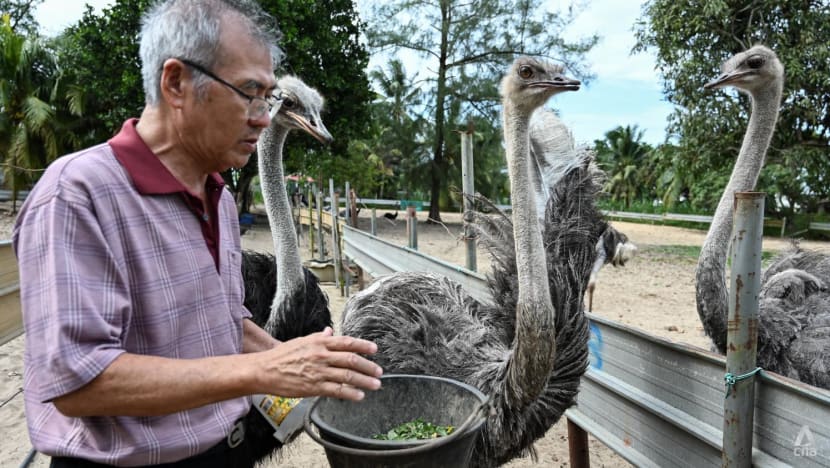
Colin Teh feeding ostriches at his farm in Sungai Rengit, Johor. (Photo: CNA/Fadza Ishak)
PENGERANG, Johor: As Colin Teh walked across a sandy paddock of the Desaru Ostrich Farm, one of the dozens of flightless, shaggy-feathered birds he owns wandered over and nipped at his collar.
The 70-year-old farmer barely winced. Teh stroked its feathers gently and held out his hand. The 2.5m tall ostrich, with its elongated neck, then pecked its beak furiously at his bare fingers.
“When they peck the fingers, it’s a sign of affection - not aggression. It's a sign they accept you as a friend,” said the Singaporean.
“It doesn’t hurt at all. They are very adorable creatures,” added Teh.
Teh’s special bond with his ostriches goes back for years. He has been rearing African black-necked ostriches since 1995.
Today, the Desaru Ostrich Farm, which is located in Pengerang, Johor, is one of the largest in Malaysia. It is also popular among Singaporean tourists who visit Johor on day trips and short vacations.
In a recent interview with CNA at his farm, Teh looked back on his career and how he had to make some sacrifices to keep the business going over the last 28 years.
In spite of the hardships he encountered, especially during the COVID-19 pandemic, Teh said he is glad he made the decision to pursue his passion.
QUITTING FLYING FOR FARMING
Teh’s journey as a farmer began as a gamble.
In the 80s, Teh graduated as a military pilot with the Republic of Singapore Air Force. He was posted early on as an instructor to train pilot cadets.
“I did not fit into the organisation and it was not long before I decided to quit flying,” said Teh, who resigned from the RSAF in 1994.
“I decided to do something which I have passion in - which is farming,” he added.
He acknowledged that he was leaving a career many considered to be lucrative and an “iron rice bowl”. However, Teh was adamant that he would switch his pilot uniform for farming overalls.
On a trip to South Africa in 1995, he visited an ostrich farm and developed an affinity with the large flightless birds.
He figured that rearing ostriches could also be profitable given that they were easy to breed.
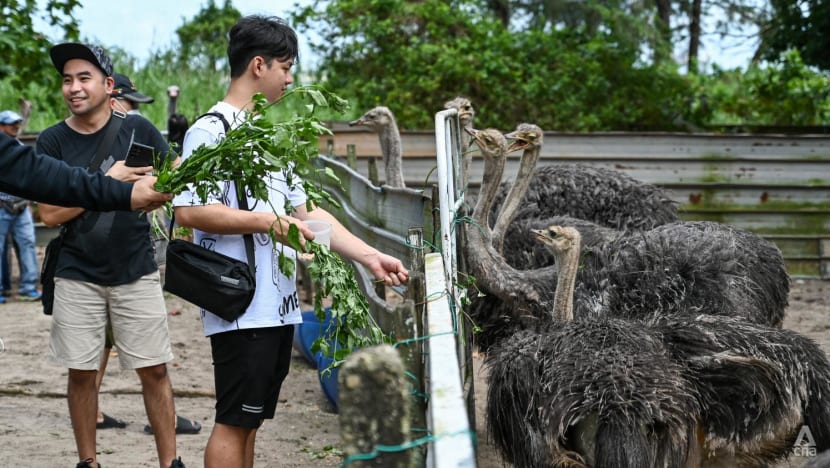
“People often have very wrong perceptions of ostriches. Just because they are tall and strange looking, they think ostriches are aggressive. But I’ve learned that ostriches are docile and adorable if treated correctly,” said Teh.
He later visited Malaysia and purchased 30 juvenile ostriches from an agricultural station and opened his first farm in Semenyih, Selangor.
Teh raised around RM1 million (US$230,000) in capital to open the farm by selling off a piece of land he owned in Malaysia.
The business was profitable in the early years. He received good returns on investment and increased the scale of his farm.
After this first 30, he bought another batch of 70 birds in the next month and by the year 2000, decided to move his farm from Semenyih to the farm's current location in Sungai Rengit, a town in southeast Johor.
The farm is a one-and-a-half hour’s drive from Johor Bahru.
“It is close to Singapore, so it’s very convenient for me to go back and visit my family,” said Teh.
“It’s also convenient for tourists from Singapore to visit, and the place became especially crowded during weekends and school holidays,” he added.
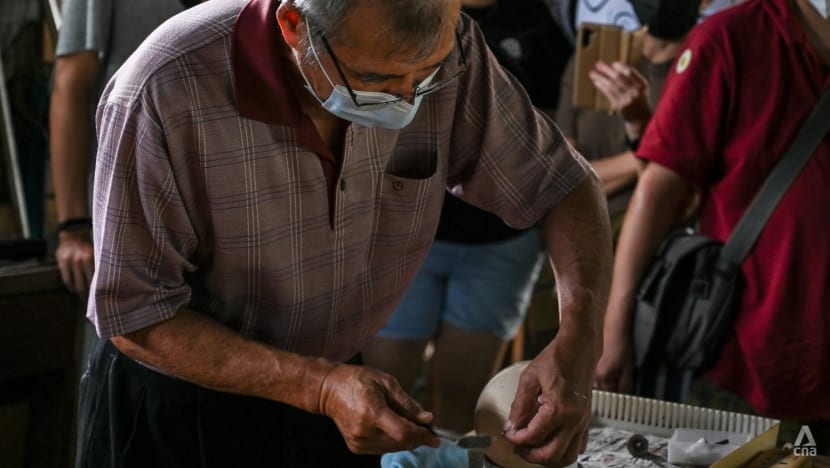
By 2008, his farm had housed 500 ostriches. It became a one-stop tourist attraction, with visitors able to attend educational demonstrations, ostrich rides for children as well as a restaurant that serves ostrich egg omelets among other delicacies.
Teh said that before COVID-19, his farm did cull a "small number" of birds and served them as menu options for visitors, such as stir-fried ostrich meat and ostrich burger.
However, Teh noted that ostrich meat was not a lucrative business as only 20 per cent of an ostrich is considered "edible meat" - the bird's legs and thigh.
COVID-19 AND CULLING OSTRICHES TO KEEP FARM GOING
However, the COVID-19 pandemic brought tourism to a grinding halt. Between 2020 and 2022, the farm barely had visitors and Teh lost a major source of revenue to keep the business going.
The Movement Control Order imposed during the pandemic by the Malaysian government meant that visitors from Singapore were also not allowed to cross the borders freely to visit.
Meanwhile, the farm was bleeding financially. Expenses such as ostrich feed, maintenance and manpower costs remained high and there were negligible visitor proceeds to lean on.
“Every month, expenses are between RM15,000 and RM20,000. This stretched over two-and-a-half years. It was taxing, very disheartening. I considered shutting down,” said Teh.
He then had no choice but to sell off some property owned by his family in Malaysia, using the proceeds to keep the farm going.
Even that was not sufficient. As the pandemic raged on and the farm’s future became increasingly jeopardised, Teh realised he had no choice but to cull “a large number” of his birds for meat to vendors so that he could generate some revenue and lower costs.
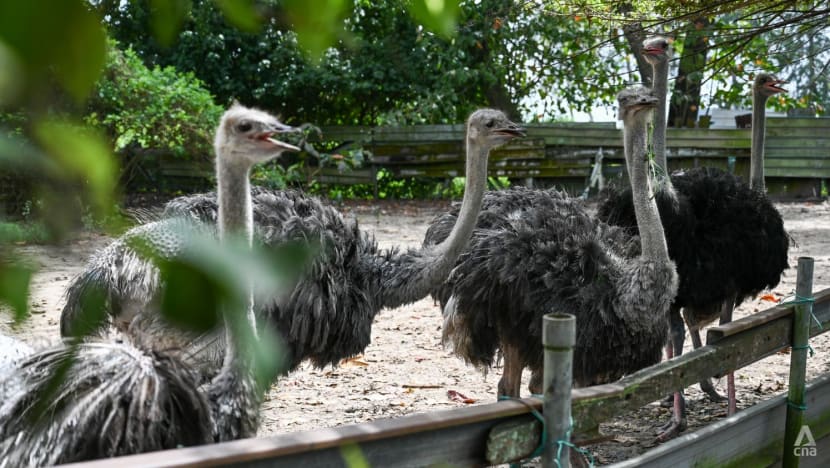
In 2019, the farm had around 300 ostriches. But today, there are only around 100 left as some died naturally while others were culled.
Being an animal lover, it was a tough exercise for Teh.
“When you talk about culling ostriches, I was hesitant. The only way I could get through with it was to avoid contact with the ostriches to be culled. We kept them at the back of the farm and would not go close to them,” said Teh.
“We had to keep the farm going and generate some income to cover the feed and maintenance costs. It costs around RM6 to feed an ostrich each day. So if you multiply it by 200 or 300, it will run into the thousands quickly”.
Thankfully for Teh, movement restrictions in Malaysia due to the COVID-19 pandemic have since been lifted and his operations are profitable once again.
THE SEARCH FOR A SUCCESSOR
With age and health issues catching up, Teh told CNA that he is looking to retire in the short term.
Together with his wife Joyce, the couple has managed the business for almost three decades and Teh is keen on handing over operations. He, however, said that he would like to remain as a consultant who would visit the farm periodically.
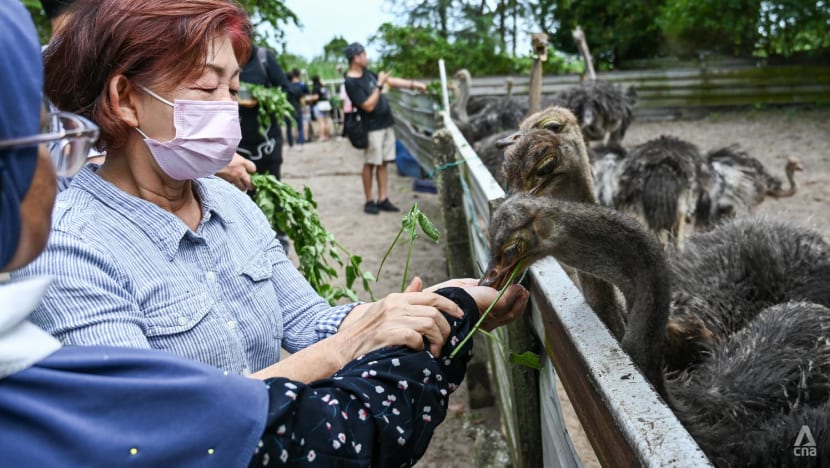
“Farming is a tough lifestyle. You compromise a lot and live away from your family. While I spent most of my time in Malaysia, my children were in Singapore. We also have family in Kuala Lumpur and we were separated,” said Teh.
However, he admitted that finding a successor to lead operations at the farm is not easy. Teh said that his children are now busy with their own careers.
“Whenever my grandchildren would come, they would beg me not to sell the farm. The youngest once told me he would take over one day. Now it’s easy to say, but when they graduate (from their studies), let’s see,” he added.
Over the last three months, Teh has been grooming his nephew Kuan Yik Han to perhaps manage the farm one day.
Prior to joining the farm in January 2023, Kuan ran his own business and had never worked in farming. He told CNA that thus far, he finds the job rewarding.
“It’s a lot of walking in the mud and being sweaty. But I think it’s good work. As the saying goes, ‘you don’t know how rewarding it is until you try’,” said Kuan, who is in his 30s.
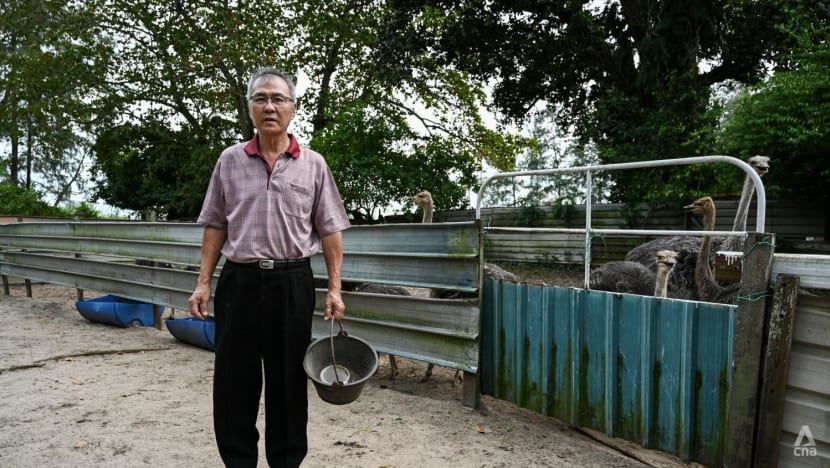
“Ostrich is a special kind of animal, they are easy to tame and nurture and not afraid of humans,” he added.
Teh said he is optimistic that Kuan would be a suitable candidate to manage the farm and care for the ostriches.
“It has been 2 to 3 months and he has shown a lot of enthusiasm and has contributed a lot to the farm,” said Teh.
“There’s hope that in the near future he will take over,” he added.




Comments
Post a Comment